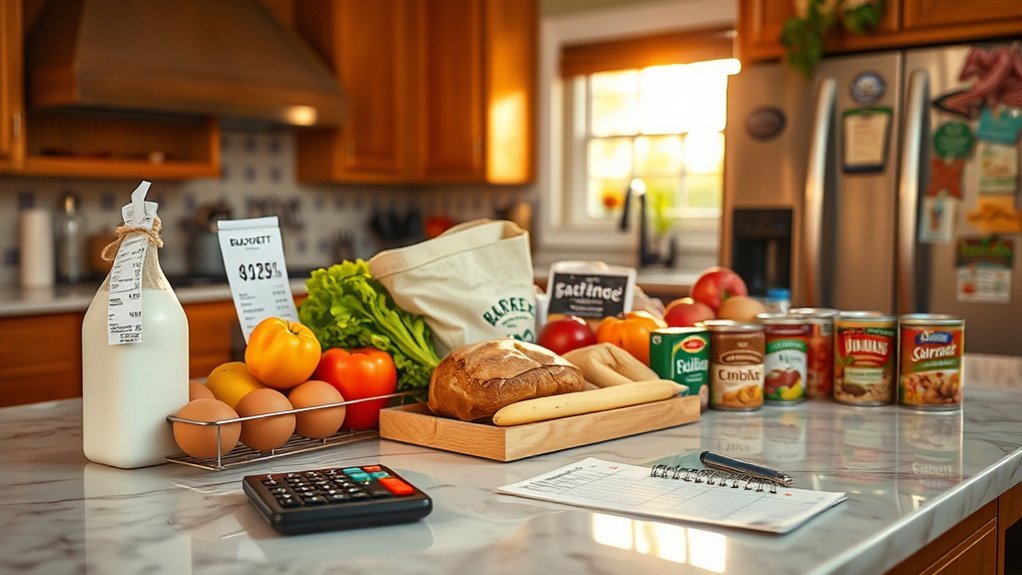Think of Tulsa as pleasantly affordable — not bargain-basement, just sensible — and you’ll find costs that let your paycheck stretch further than in many U.S. cities. You’ll want to know typical rents, utility and grocery ranges, transportation and healthcare outlays, and what salary covers a comfortable lifestyle. Keep going to see concrete monthly figures and a realistic pre-tax income target so you can plan with confidence.
Tulsa Housing Costs: Renting vs. Buying

If you’re weighing renting against buying in Tulsa, the numbers favor renting for lower monthly outlay but not always for long‑term cost. You’ll find Tulsa rent is markedly below national norms: the average rent in Tulsa runs roughly $897–$1,011 monthly, with a one‑bedroom apartment about $847–$914. That makes rent vs. buy a clear short‑term win for flexibility and immediate savings, helping you pursue financial freedom and mobility.
Tulsa home prices and median home price figures vary—commonly cited near $431,839–$440,290 in some datasets and lower in others—so mortgage costs at ~7.1% can push monthly payments close to or above local rents. Compare housing costs per month for renters (~$1,797 examples) versus homeowners (~$1,959 examples), weighing equity growth, tax benefits, and upkeep. If you want affordable housing and liberation from large down payments, renting often aligns better; buying can build wealth but requires a longer horizon and disciplined planning. Additionally, building a house can often be more expensive than buying an existing home, which is an important factor to consider when evaluating your housing options.
Monthly Utilities, Internet, and Phone Expenses

While Tulsa’s housing may be cheap, your monthly utilities — energy, internet, and phone — still add a meaningful line item: expect around $200–$400/month for a single-adult renter and more for homeowners or larger households. You’ll see energy bills average about $202/month (electric alone ~ $143.65), and combined basic utilities often fall between $371–$827 depending on status. That matters when you’re freeing up household income and balancing average monthly rent against utilities expenses.
- Energy: plan ~$186–$205/month; seasonal swings change totals.
- Internet: budget for reliable service; bundle options can cut costs.
- Phone service: expect roughly $198/month, near national average.
- Renters vs homeowners: renters trend lower; homeowners face higher utility use.
- Savings levers: efficiency upgrades, conservative usage, and choosing plans wisely reduce monthly strain.
Additionally, regular inspections and maintenance of home systems, similar to air conditioning function, can help prevent unexpected costs from arising. You can protect your budget in Tulsa’s lower cost environment by tracking usage and prioritizing investments that lower recurring bills.
Grocery Prices and Typical Food Budget

Look over your grocery budget and you’ll see Tulsa generally keeps food costs a touch below the national average — expect about $674/month for a single renter and roughly $1,341/month for a homeowner, with per-person Oklahoma spending near $346/month versus about $355 nationally. You can plan confidently: average grocery spending here is modest, groceries cost roughly 2.5% less than the U.S. Typical food prices (milk $4.59, eggs $3.10, bread $3.78, ground beef $6.97, coffee $5.20) help you model monthly groceries and the household grocery budget. Regular preventative measures can also help reduce unexpected expenses in other areas of your budget.
| Item | Price |
|---|---|
| Milk (gal) | $4.59 |
| Ground beef (lb) | $6.97 |
Use these figures to set a realistic food budget. For families, expect around $1,311/month for young kids or $1,531 for older kids. Track grocery prices and adjust your household grocery budget to free resources for other goals — liberation starts with clear, data-driven choices about the cost of food.
Healthcare, Transportation, and Other Essentials

Having set a realistic grocery budget, you’ll want to factor in healthcare, transportation, and other monthly essentials that shape your overall cost of living in Tulsa. You’ll see doctor visits average $115.26, a dentist appointment about $124.66, and routine optometry near $122.45. Prescription drugs average $29.51; OTC ibuprofen runs ~$11.04.
Having set groceries, also budget healthcare and transport—expect doctor, dentist, and prescription costs to plan for.
Monthly healthcare expenses tend to be about $151 for renters and $412 for homeowners, with families falling between $362–$414 depending on kids’ ages.
- Expect monthly transportation costs around $324 if you’re renters, up to $682 for homeowners.
- Gasoline averages $2.89 per gallon; factor commute miles into your budget.
- Choose public transit—single rides are $1.50—to lower costs and expand mobility.
- Budget for unexpected medical visits and prescription spikes.
- Track monthly healthcare expenses alongside rent to protect financial freedom. Regular maintenance can help prevent costly repairs in the long run.
Use these figures to design a resilient budget that prioritizes health, mobility, and autonomy.
Recommended Salary and Sample Monthly Budgets

Plan your income around concrete numbers: for a comfortable single-adult lifestyle in Tulsa you’ll want about $52,272 pre-tax annually, and typical monthly budgets look like $4,356 for a renter household (housing ~$1,797, groceries $674, utilities $371, transportation $324) and $7,840 for a homeowner household (housing ~$1,959, groceries $1,341, utilities $827, transportation $682). Use a Cost of Living Calculator to compare these figures to your current pay and set a recommended salary target that matches your goals.
Tulsa monthly expenses show average rents and housing costs below many metros, so your monthly income can stretch further compared to the national average (about 7.1% lower overall; renter costs ~8.6% below).
If you’re budgeting freedom, model scenarios for rent prices, groceries and utilities, and transportation to see trade-offs.
For couples with young kids, expect around $7,092 monthly. Additionally, consider how long-term savings from investing in a home gym can further enhance your financial stability and well-being.
Translate numbers into action: negotiate salary, prioritize savings, and align choices with the pre-tax salary needed to sustain your desired lifestyle.
Frequently Asked Questions
What Is the Average Cost of Living in Tulsa?
You’ll find Tulsa’s average cost of living’s lower than national: budget about $52k pre-tax, factoring neighborhood comparisons, commuting costs, grocer alternatives, utility breakdowns, healthcare access, childcare options, pet expenses, entertainment budgeting, seasonal costs, senior living.
How Much Money Do You Need to Live Comfortably in Tulsa, Oklahoma?
You’ll need about $52,272/year to live comfortably in Tulsa. Balance housing options, transportation costs, groceries budgeting, healthcare expenses, utility bills, entertainment choices, childcare prices, pet ownership, rural vs. urban tradeoffs, and seasonal expenses.
What Is the Average Monthly Cost of Living in Oklahoma?
About $3,500–$4,500 monthly on average; you’ll factor Oklahoma healthcare, Rural transportation, Seasonal utilities, Local taxes, Grocery variations, Childcare costs, Higher education, Elder care, Entertainment options, and Internet access into that practical, data-driven estimate.
What Is the Average Cost of Living Expenses?
You’ll need roughly $1,800–$2,000 monthly for core expenses; use utility hacks, grocery savings, transportation tips, healthcare budgeting, entertainment expenses control, pet costs planning, childcare planning, emergency fund, subscription trimming, home maintenance to stretch it.
Conclusion
You can live comfortably in Tulsa without chasing mythical riches—rent for a one-bedroom runs about $847–$914, utilities and internet add $200–$400, groceries about $346–$674, and transportation roughly $324. With modest healthcare and phone costs, Tulsa’s ~7% lower cost of living means aiming for about $52,000 pre-tax will cover essentials and savings. Like finding an oasis on the plains, this practical, data-driven budget keeps your finances steady and predictable.


